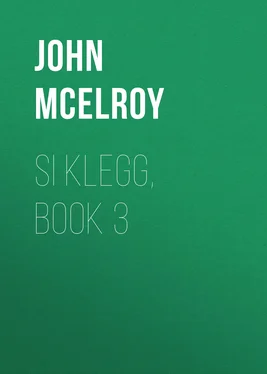John McElroy - Si Klegg, Book 3
Здесь есть возможность читать онлайн «John McElroy - Si Klegg, Book 3» — ознакомительный отрывок электронной книги совершенно бесплатно, а после прочтения отрывка купить полную версию. В некоторых случаях можно слушать аудио, скачать через торрент в формате fb2 и присутствует краткое содержание. Жанр: foreign_prose, История, foreign_edu, foreign_antique, на английском языке. Описание произведения, (предисловие) а так же отзывы посетителей доступны на портале библиотеки ЛибКат.
- Название:Si Klegg, Book 3
- Автор:
- Жанр:
- Год:неизвестен
- ISBN:нет данных
- Рейтинг книги:5 / 5. Голосов: 1
-
Избранное:Добавить в избранное
- Отзывы:
-
Ваша оценка:
- 100
- 1
- 2
- 3
- 4
- 5
Si Klegg, Book 3: краткое содержание, описание и аннотация
Предлагаем к чтению аннотацию, описание, краткое содержание или предисловие (зависит от того, что написал сам автор книги «Si Klegg, Book 3»). Если вы не нашли необходимую информацию о книге — напишите в комментариях, мы постараемся отыскать её.
Si Klegg, Book 3 — читать онлайн ознакомительный отрывок
Ниже представлен текст книги, разбитый по страницам. Система сохранения места последней прочитанной страницы, позволяет с удобством читать онлайн бесплатно книгу «Si Klegg, Book 3», без необходимости каждый раз заново искать на чём Вы остановились. Поставьте закладку, и сможете в любой момент перейти на страницу, на которой закончили чтение.
Интервал:
Закладка:
"Cel'bratun my freedom," gasped the negro. "Groundhog done tole me to."
"I'd like to celebrate his razzled head offen him," exploded the Deacon. "I'll welt him into dog's meat hash if I kin lay my hands on him. He's too mean and wuthless to even associate with mules. If I'd a dog on my place as onery as he is I'd give him a button before night. He's not content with bein' a skunk himself; he wants to drag everybody else down to his level. Learnin' you to drink whisky and fight as soon as you're out o' bondage. Next thing he'll be learnin' you to steal sheep and vote for Vallandigham. I'd like to put a stone around his neck and feed him to the catfish."
There was something so strange and earnest about the Deacon's wrath that it impressed the negro more than any of the most terrible exhibitions of wrath that he had seen his master make. He cowered down, and began crying in a maudlin way and begging:
"Pray God, Boss, don't be so hard on a poor nigger."
Si, who had learned something more of the slave nature than his father, ended the unpleasant scene by giving Abraham Lincoln a sharp slap across the hips with a piece of clapboard and ordering:
"Pick up that camp-kettle, go to the spring and fill it, and git back here in short meter."
The blow came to the negro as a welcome relief. It was something that he could understand. He sprang to his feet, grinned, snatched up the campkettle, and ran to the spring.
"I must get that man away from here without delay," said the Deacon. "The influences here are awful. They'll ruin him. He'll lose his soul if he stays here. I'll start home with him to-morrow."
"He'll do worse'n lose his soul," grumbled Shorty, who had been looking over the provisions. "He'll lose the top of his woolly head if he brings another gang o' coons around here to eat us out o' house and home. I'll be gosh durned if I don't believe they've eat up even all the salt and soap. There ain't a crumb left of anything. Talk about losin' his soul. I'd give six bits for something to make him lose his appetite."
"I'll take him home to-morrow," reiterated the Deacon. "I raised over 'leven hundred bushels o' corn last year, 'bout 500 o' wheat, and just an even ton o' pork. I kin feed him awhile, anyway, but I don't know as I'd chance two of him."
"What'll you do if you have him and the grasshoppers the same year, Pap?" inquired Si.
That night the Deacon began his preparations for returning home. He had gathered up many relics from the battlefield to distribute among his friends at home and decorate the family mantlepiece. There were fragments of exploded shells, some canister, a broken bayonet, a smashed musket, a solid 12-pound shot, and a quart or more of battered bullets picked up in his walks over the scenes of the heavy fighting.
"Looks as if you were going into the junk business. Pap," commented Si, as the store was gathered on the floor.
The faithful old striped carpetsack was brought out, and its handles repaired with stout straps. The thrifty Deacon insisted on taking home some of Si's and Shorty's clothes to be mended. The boys protested.
"We don't mend clothes in the army, Pap," said Si. "They ain't wuth it. We just wear 'em out throw 'em away, and draw new ones."
The Deacon held out that his mother and sisters would take great pleasure in working on such things, from the feeling that they were helping the war along. Finally the matter was compromised by putting in some socks to be darned and shirts to be mended. Then the bullets, canister, round-shot, fragments of shell, etc., were filled in.
"I declare," said the Deacon dubiously, as he hefted the carpetsack. "It's goin' to be a job to lug that thing back home. Better hire a mule-team. But I'll try it. Mebbe it'll help work some o' the stupidity out o' Abraham Lincoln."
The whole of Co. Q and most of the regiment had grown very fond of the Deacon, and when it was noised around that he was going, they crowded in to say good-by, and give him letters and money to take home. The remaining space in the carpetsack and all that in the Deacon's many pockets were filled with these.
The next morning the company turned out to a man and escorted him to the train, with Si and his father marching arm-in-arm at the head, the company fifers playing,
"Ain't I glad to get out of the Wilderness,
Way down in Tennessee,"
and Abraham Lincoln, laden with the striped carpetsack, the smashed musket and other relics, bringing up the rear, under the supervision of Shorty. Tears stood in the old man's eyes as he stood on the platform of the car, and grasped Si's and Shorty's hands in adieu. His brief farewell was characteristic of the strong, self-contained Western man:
"Good-by, boys. God bless you. Take care of yourselves. Be good boys. Come home safe after the war."
The boys stood and watched the train with sorrowful eyes until it had passed out of sight in the woods beyond Overall's Creek, and then turned to go to their camp with a great load of homesickness weighing down their hearts.
"Just think of it; he's going straight back to God's country," said someone near.
A sympathetic sigh went up from all.
"Shet up," said Shorty savagely. "I don't want to hear a word o' that kind. He pulled his hat down over his eyes, rammed his hands deep in his pockets, and strode off, trying to whistle
"When this cruel war is over,"
but the attempt was a dismal failure. Si separated from the crowd and joined him. They took an unfrequented and roundabout way back to camp.
"I feel all broke up. Si," said Shorty. "I wish that we were goin' into a fight, or something to stir us up."
Si understood his partner's mood, and that it was likely to result in an outbreak of some kind. He tried to get him over to the house, so that he could get him interested in work there.
They came to a little hidden ravine, and found it filled with men playing that most fascinating of all gambling games to the average soldier—chucka-luck. There were a score of groups, each gathered around as many "sweat-boards." Some of the men "running" the games were citizens, and some were in uniform. Each had before him a small board on which was sometimes painted, sometimes rudely marked with charcoal, numbers from 1 to 6.
On some of the boards the numbers were indicated by playing-cards, from ace to six-spot, tacked down. The man who "ran" the game had a dice-box, with three dice. He would shake the box, turn it upside down on the board, and call upon the group in front of him to make their bets.
The players would deposit their money on the numbers that they fancied, and then, after the inquiry, "All down?" the "banker" would raise the box and reveal the dice. Those who had put their money on any of the three numbers which had turned up, would be paid, while those who bet on the other three would lose.
Chuck-a-luck was strictly prohibited in camp, but it was next to impossible to keep the men from playing it. Citizen gamblers would gain admittance to camp under various pretexts and immediately set up boards in secluded places, and play till they were discovered and run out, by which time they would have made enough to make it an inducement to try again whenever they could find an opportunity. They followed the army incessantly for this purpose, and in the aggregate carried off immense sums of the soldiers' pay. Chuck-a-luck is one of the fairest of gambling games, when fairly played, which it rarely or never is by a professional gambler. A tolerably quick, expert man finds little difficulty in palming the dice before a crowd of careless soldiers so as to transfer the majority of their bets to his pocket. The regular citizen gamblers were reinforced by numbers of insatiable chuck-a-luckers in the ranks, who would set up a "board" at the least chance, even under the enemy's fire, while waiting the order to move.
Читать дальшеИнтервал:
Закладка:
Похожие книги на «Si Klegg, Book 3»
Представляем Вашему вниманию похожие книги на «Si Klegg, Book 3» списком для выбора. Мы отобрали схожую по названию и смыслу литературу в надежде предоставить читателям больше вариантов отыскать новые, интересные, ещё непрочитанные произведения.
Обсуждение, отзывы о книге «Si Klegg, Book 3» и просто собственные мнения читателей. Оставьте ваши комментарии, напишите, что Вы думаете о произведении, его смысле или главных героях. Укажите что конкретно понравилось, а что нет, и почему Вы так считаете.












